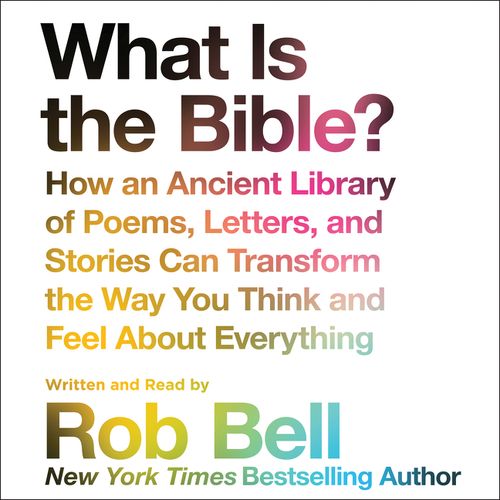Rob Bell wrote Love Wins, in which he dared to make a theological and scriptural case for considering a kind of Christian universalism that has always been a part of the Christian tradition. He was generally cut-off and condemned by the American evangelical community that values predictability and stasis above just about everything else. It changed his life. He moved to California and stopped working at churches (although he's continued to be a pastor to a pretty diverse group of people, include Superbowl MVP,
Aaron Rodgers and comedian Pete Holmes). He's dabbled in TV, started a podcast, holds a regular slot at Largo in LA - and, most importantly,
continued writing.
Things got a little wonky there for a while. He showed up on Oprah and some of his writing started sounding more generally spiritual and less specifically Christian. People assumed he'd just gone off the deep end, so to speak - in evangelical cultural terms, just another lost soul seduced to collusion with the ways of the world.
That makes it sound a bit worse than it is - you can read the Christianity into Bell's most recent book, How to Be Here, even if he doesn't use the language. That being said, his newest book, What is the Bible?, was not the avenue I expected him to turn down next. In typical Rob Bell style, it's a short, quick, direct, and accessible look at a particularly complex topic. He addresses the Bible, it's creation, development, and purpose - as well as approaching technical issues of genre, culture, interpretation, and language with specific examples rather than jargon and prose.
I know many Christians are skeptical of this treatment, fearing that Bell has moved beyond where most people are comfortable. If you're a straightforward, typical American evangelical, particularly one who's not too uncomfortable with the fundamentalist label, that might be true. I doubt all of what Bell has to say would please those in the tradition from whence he comes. However, he clearly explains how that tradition provided the pathway to ask questions and discover answers leading to where he is. There's nothing in this book that would contradict anything I heard or learned in seminary or would be outside the bounds of my tradition in the Church of the Nazarene.
Does he ruffle some feathers around the edges? Yeah, especially in the final section of the book that serves as a sort of Q&A, particularly geared around difficult and controversial questions. I'm not sure I appreciate the casualness with which he deflects questions of biblical authority and inerrancy - I certainly agree with what he has to say, but perhaps not in the way it's done. Yet this book is clearly for his "new" audience.
It is not at all written for people within the camp who embraced his early work. What is the Bible? presents a healthy, responsible, in-depth, engaging understanding of the Bible to people who are searching for meaning and may have otherwise written it off.
If I were teaching an Intro to the Bible course at some Christian college, I'd put this on the textbook list. I think it would work equally well in a congregational setting where people are prepared to be stretched and challenged and willing to talk about complex issues. I've read just about everything Bell's published and this is among his best work. There's more scripture, exegesis, research, and gospel than you'd find in 99% of sermons out there (mine included).
It's a presentation of living, active, meaningful scripture that speaks to the world with honesty and grace. Bell's freedom from the moralistic tyranny of a Christian publisher allows him to be both reverent and irreverent, but most of all real. It's a great read and I couldn't be more pleasantly surprised.

2 comments:
Thank you for your review. Very helpful.
Thank you for your review. Very helpful.
Post a Comment